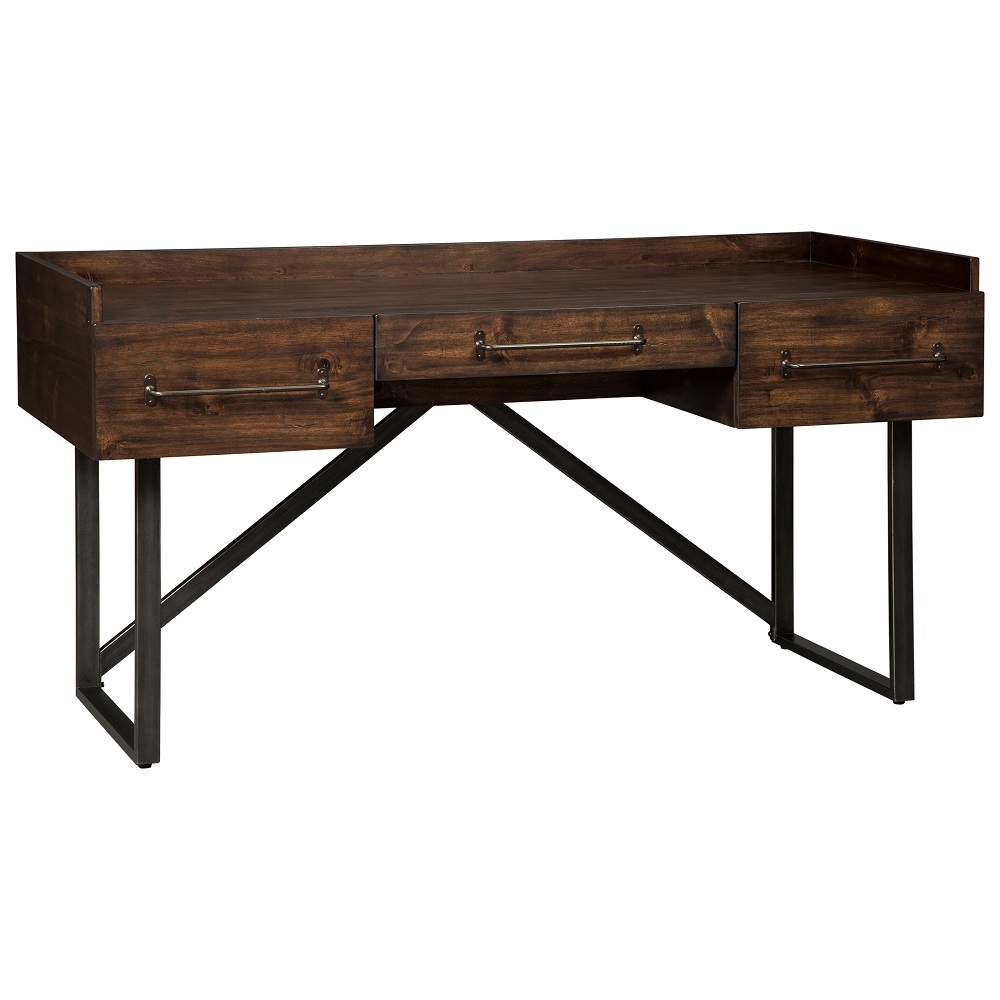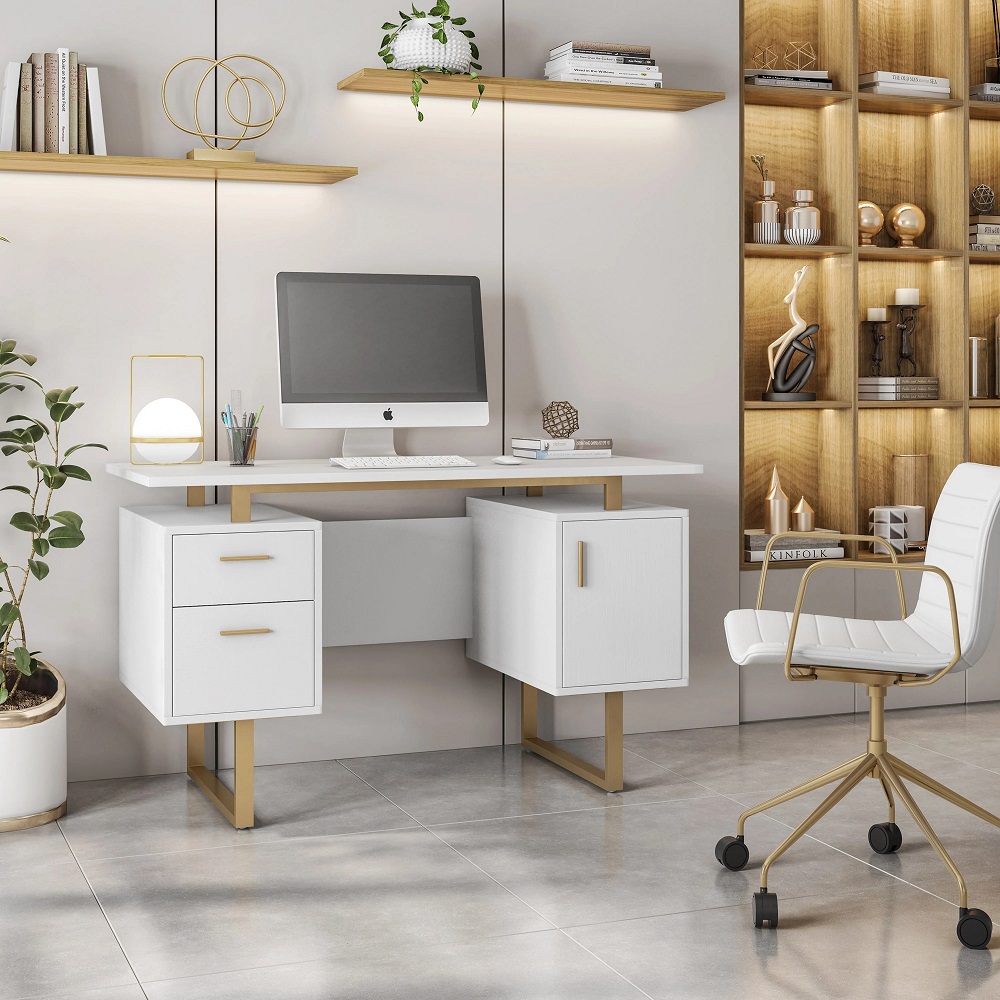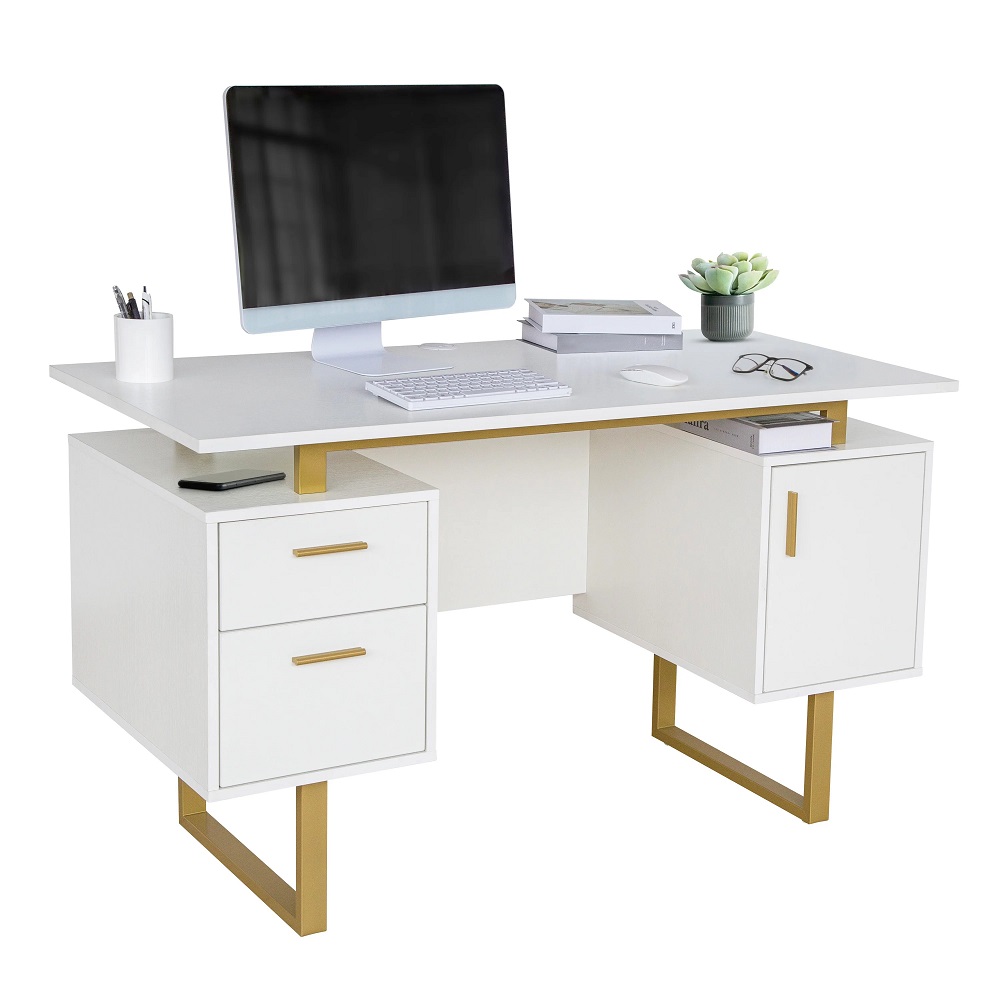Importance of Selecting the Right Desk
Selecting the right desk for office use is critical. It impacts productivity and comfort throughout the workday. The desk is not just a furniture piece. It’s a tool that assists daily tasks and supports workflow. An ill-fitting desk can lead to discomfort, disorganization, and even health issues. Therefore, choosing a desk that meets your needs is a priority. It should fit well in the office space and be sturdy. Look for a desk that reflects your style and fits your work habits. Don’t forget the importance of a well-chosen office desk for client impressions. Lastly, it must match the office’s technological requirements. In short, a good office desk increases efficiency and adds to workplace ambiance.
Identifying Your Office Desk Needs
Before you start shopping for a desk for office use, it’s essential to assess your needs. This will ensure the desk you choose supports your daily activities effectively. Think about the tasks you perform regularly. Do you deal with lots of paperwork, need multiple monitors, or require special equipment? Here are some factors to consider:
- Space: Measure your office space. Make sure the desk won’t overcrowd the area.
- Desk Size: Consider the surface you need. Plan for computers, documents, and other items.
- Storage: Do you need drawers or shelves? Think about what you must store within reach.
- Use Frequency: Is this desk used occasionally or for long daily hours? This influences durability needs.
- Primary User: Consider who will use the desk. Adjustable heights may be needed for different users.
Aligning the desk for office intricacies with your work patterns maximizes your efficiency. Remember, the right desk should promote organization and help you manage your workload smoothly.

Types of Desks for Different Office Layouts
When selecting a desk for office settings, consider the layout of the space. Different types of desks fit different layouts, affecting flow and function. Here are some common desk types and the layouts they suit best:
- Straight Desks: Ideal for most traditional office layouts. They fit well against walls or in rows in open-plan areas.
- L-Shaped Desks: Great for corner spaces. They offer extra surface area and can define personal workspaces in larger rooms.
- U-Shaped Desks: Suitable for spacious areas. They surround the user with accessible work surfaces and storage.
- Standing Desks: Stand desks cater to health-conscious environments. They can adjust to sitting or standing heights.
- Modular Desks: Modular options allow for flexibility. They can reconfigure to fit evolving office layouts.
- Executive Desks: Larger, often luxurious desks for spacious private offices. They make a statement and offer ample space.
- Compact Desks: For small offices or home offices. These desks save space while still providing a functional work area.
Ensure the desk you choose complements the office layout. It should enhance workflow, not hinder it. The right desk for an office can transform a space, making it more efficient and pleasant to work in.
Material Considerations for Durability and Aesthetics
When choosing a desk for office use, the desk’s material is key. It influences both how long the desk will last and how it looks. A desk’s look can impact the overall feel of your office space. A strong, durable material suggests professionalism and stability. Here are some materials commonly used for office desks:
- Wood: Classic and elegant, wood desks can be expensive. But they offer a warm, rich feel to any office.
- Laminate: Affordable and practical, laminate can mimic wood or other finishes. It’s durable and resists scratches.
- Metal: Desks with metal frames or legs are strong and long-lasting. They deliver a modern and industrial edge to your workspace.
- Glass: Glass desks are sleek and can make a small space appear larger. They require regular cleaning to maintain their sparkle.
Consider the daily wear and tear your desk will endure. Do you move a lot of papers, use heavy equipment, or spill coffee often? Choose materials that can handle your activities without showing too much wear.
Also, think about the desk’s color and finish. Choose ones that match or complement your office decor. Remember, the desk is a big part of your office’s aesthetics.
Lastly, keep in mind that the desk you select is an investment. You want it to last for years. Pay attention to the desk’s material quality and construction. This will save you from future costs for repairs or replacements. Balancing durability and style will lead to a wise purchase decision for your office desk.
Ergonomics and Comfort in Desk Design
When picking a desk for office use, ergonomics should be a top concern. A desk that is ergonomic eases strain on the body, reducing the risk of discomfort and injury over time. Key ergonomic aspects to consider include:
- Height: The desk height is crucial for maintaining a comfortable posture. It should align with the user’s elbow height when seated.
- Depth: Enough depth is needed for proper distance from the computer screen. This minimizes eye strain.
- Legroom: There must be adequate space under the desk for legs to move and change position.
- Adjustability: An adjustable desk allows users to alternate between sitting and standing. This helps in reducing the negative impacts of prolonged sitting.
- Wrist and Forearm Support: The desk design should support the forearms and wrists to prevent strain during typing or writing.
An ergonomic desk for office doesn’t just improve comfort. It also boosts productivity and concentration. Try to find a desk with features like adjustable heights or tilt options. They help in creating a workspace that’s tailored to your body’s needs.
Choosing a desk with the right ergonomics is an investment in your health. It’s not just about comfort, but also about preventing long-term health issues. Look for a desk that supports a natural posture and promotes movement. This will help to maintain energy levels and focus throughout the day. Don’t compromise on ergonomics, even if it means spending a bit more. The benefits far outweigh the cost.

Balancing Functionality and Style
When choosing a desk for office, you must balance functionality and style. A practical desk meets your work needs, while a stylish desk complements the office decor. Here’s how to strike that balance:
- Assess Functionality: Focus on the desk’s role in your daily tasks. Ensure it has the size, shape, and features necessary for your workflow.
- Consider Style: Think about the desk’s design and how it fits with your office aesthetics. A stylish desk can motivate you and impress clients.
- Match Decor: Select a desk that goes well with the office theme. Look for colors and materials that blend in or stand out in the right way.
- Test Durability: A good desk should last. Choose materials known for longevity without sacrificing appearance.
- Flexibility Counts: A desk with adaptable features, like adjustable heights, can cater to different tasks and people.
Remember, a desk is not just for work. It’s part of your office’s identity. As you shop for a desk for office use, imagine how each option fits into your space. Pick a desk that is as pleasing to look at as it is to use. This will ensure your office is both efficient and appealing.
Storage Solutions and Desk Accessories
Choosing the right desk for office space often comes down to functionality. Storage solutions play a big part in this. A clean and organized desk boosts productivity and reduces stress. When shopping for a desk, think about the types of items you need to store. Do you have files, office supplies, or personal items? Each requires different storage solutions.
- Drawers: Many desks come with built-in drawers. They hide away your stuff and keep the desk top clear.
- Shelves: Open shelves on a desk can hold books or display items. Add bins or baskets for small items.
- Keyboard Trays: These save space on the main desk area. They slide out for use and tuck in when not needed.
- Cable Management: Desks with cable holes or clips help manage cords. A tidy desk surface means less clutter.
- Desk Organizers: These can be trays, holders, or stands. They keep pens, paper, and gadgets in order.
Accessories also enhance your work area. A lamp provides good lighting. A good chair supports your posture. Add a plant or photo frame to make the space yours.
Remember, your desk supports your work. Choose one that has the storage you need. Consider accessories that aid your work and make you happy. This way, your desk becomes a personal and efficient station for productivity. Keep the keywords, desk for office, in mind as you mix function with personal style.

Tips for Shopping for Office Desks
When looking to buy a desk for office needs, keep these shopping tips in mind:
- Set a Budget: Decide how much you can afford before you shop. Stick to it to avoid overspending.
- Measure Your Space: Get the exact dimensions of your office area. This ensures the desk fits well without cramping.
- Think Long-Term: Invest in a desk that will serve you for years. Consider quality over immediate savings.
- Style vs. Substance: Choose a desk that looks good and functions well. It should match your office and meet daily needs.
- Test Desks Out: If possible, try before you buy. Sit at the desk. Check for comfort and space.
- Read Reviews: Look at what others say about the desk. Reviews can alert you to potential issues.
- Warranty Matters: Check if the desk comes with a warranty. This can save you money on future repairs.
Remember these tips when you search for the perfect desk for office. They can lead to a smart buy that enhances your workday and your office’s look.


